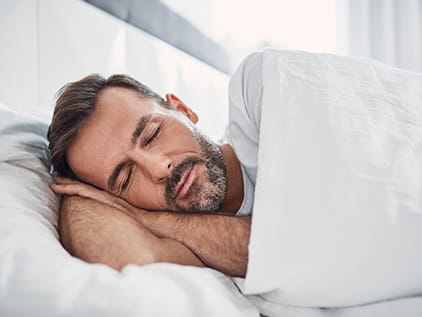January 05, 2022
Getting a good night's sleep is beneficial for your overall health and well-being. Our sleep medicine expert, Damien Stevens, MD, shares 10 tips and answers frequently asked questions about better sleep.
10 ways to get better sleep
- Avoid drinking alcohol near bedtime as it will disrupt the 2nd half of your sleep once the alcohol metabolizes and leaves the body.
- Stay active and busy during the day. Exposure to bright light and activity throughout the day tells your body that is the time to be awake.
- Use a dim light in the evening to signal the release of melatonin, which promotes sleepiness. Sleep comes easier if your body gets signals that it's time for sleep.
- Avoid stimulating things close to bedtime, such as caffeine or exercise. Exercise is important for well-being, but if it's done too late at night, it can keep you alert.
- Have a plan for when you have a tough time sleeping. For example, learn some mindful meditation techniques. Various apps, like Calm, offer guided meditations and stories to help you fall asleep.
- Do not look at clocks or check your phone if you wake up during the night. Avoid any electronic lights in your room as they can have a negative effect on sleep.
- Avoid eating large quantities near bedtime.
- Avoid naps if possible as they generally detract from nighttime sleep. Short naps may be acceptable if they are not causing you to wake up during the middle of the night.
- Avoid driving late at night.
- Keep your bedroom temperature around 64-68 degrees, which is ideal for good sleep.

Get a better night's sleep
If you have ongoing trouble with sleeping, talk to your doctor. You may want to speak with a sleep medicine specialist.





